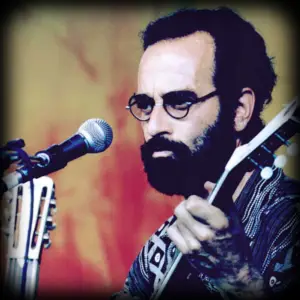BOB BROZMAN
 Barney Josephson ran The Café Society, a club that pioneered racially integrated music in New York back in the 40s. It is not surprising thet his nephew Bob Brozman got into music, but he took on the huge task in trying to integrate music from all over the world into his work, searching out ‘pre-industrial’ sounds and non-conventional rhythms to infuse into his tunes. Bob is best known for playing the resonator guitar, using the astonishing dynamics of this unique instrument to incorporate many diverse influences over a solid Blues technique.
Barney Josephson ran The Café Society, a club that pioneered racially integrated music in New York back in the 40s. It is not surprising thet his nephew Bob Brozman got into music, but he took on the huge task in trying to integrate music from all over the world into his work, searching out ‘pre-industrial’ sounds and non-conventional rhythms to infuse into his tunes. Bob is best known for playing the resonator guitar, using the astonishing dynamics of this unique instrument to incorporate many diverse influences over a solid Blues technique.
Bob performs ‘Hawaiian Blues’ on a hollow-neck guitar;
In 1979, Bob cut his first album, ‘Your Pal’ for Streetside Records, with some of his own songs like ‘Requiem for Skip James‘ sprinkled among cover versions of some classic Blues tunes. He was also a member of cartoonist Robert Crumb’s band The Cheap Suit Serenaders, who issued a quirky series if 78rpm records of music from the 20s, as well as three conventional albums. When ‘Blue Hula Stomp’, was released by Kicking Mule Records in 1981, Bob explored music from the 20s, focussing on his Blues and Hawaiian influences. A long and steady stream of albums came out over the years, with each exploring the cultural discoveries Bob had brought from the far corners of the world. Bob’s work as an ethnographer led to his discovery of the Tau Moe family and their 60 year history in Hawaiian music, and an album, documentary film and many awards followed. A meeting with John Dopyera, the inventor of the resonator guitar, led to Bob’s writing the definitive book on ‘The History and Artistry of National Resonator Instruments’. In the 90s, Bob collaborated with National Resophonic Guitars to design a baritone tricone model, and with Bear Creek Guitars to design a hollow-neck Kona guitar based on the original Weissenborns, and he used both instruments on stage and in the studio.
Bob plays his Blues like a veteran of the Delta;
Bob Brozman Discography
With Bob’s usual eclectic mix of music, he brings a lot of influences to these 21 tracks, and his version of ‘Stones in my Pathway’ is worth the cost in itself. This is a great place to start if you haven’t got any Brozman in your collection. Blues, Calypso and Hawaiian influences predominate but the real standout feature is Bob’s virtuoso playing……in any genre.